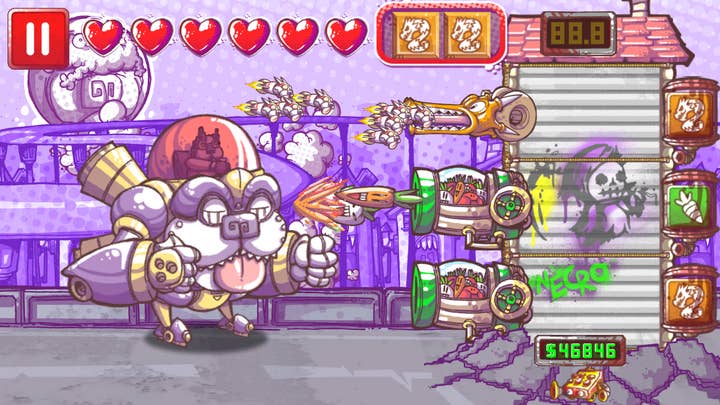How Necrosoft's flat pay structure led to better publishing deals
Founder Brandon Sheffield: "There's no way that it makes sense for me to make more money than anybody on my team when I own everything"
Seven years after Brandon Sheffield founded Necrosoft, things were going well. The distributed indie studio had three game releases -- Gunsport, Oh, Deer!, and GunHouse -- seven employees, and some money set aside.
But something still bothered Sheffield about how he was running his studio. Working out of the high-cost city of Oakland, California, he wasn't personally making a satisfying wage from his own studio, even as founder and creative director. But it wasn't just him. Some of his employees who lived in high-price areas weren't getting paid enough either, and Sheffield knew it.
So at the end of 2019, Sheffield changed how everyone at Necrosoft was paid. He switched to a completely flat pay structure, with everyone making the same amount in both wages and eventual dividends from the company's earnings.
"There's no way that it makes sense for me to make more money than anybody on my team when I own everything. It's rude"
"So previously it was close to flat, but some people, especially myself, got a little more because of living in high-cost areas," Sheffield says. "I also was at the time supplying about 40% of our company income through my own contract work. I didn't like that I was making more than other people, but it felt justified at the time because of how much of the money was coming directly from my work.
"But I always wanted to shift away from that. I just had no choice because of living in Oakland. I was already paying myself less than the average amount of rent per month for most people."
Specifically, Sheffield says, everyone got a raise -- no one went down in pay as a result of the decision.
"I felt really guilty about having more money come in than other people did," he adds. "And part of that is because, yes, I'm the creative director and I do the writing for the games and I do the business and whatever other stuff. But when it comes to the assets that I put into the game, I'm not doing code, I'm not doing art, I'm not doing music. It feels like what those people do is so much more important in a way. So it felt wrong to be taking more than them.
"There's no way that it makes sense for me to make more money than anybody on my team when I own everything. It's rude."

Though Necrosoft was doing fine at the time, Sheffield admits that the idea of suddenly giving the entire company a raise at once was daunting, especially for a studio that was already relying on its CEO's contract work to get by. And it wasn't as though Necrosoft had been funneling a ton of money to its leads to begin with.
But something funny happened. With the new flat pay structure set as part of his company's budget, he was forced to ask publishers for more money when he cut deals for games. And, to his surprise, the companies he spoke to seemed more than happy to supply it.
"Publishers actually seem to kind of like it. And that's because our payment structure is super easy to understand for them"
"Publishers actually seem to kind of like it," he says. "And that's because our payment structure is super easy to understand for them. I can say, 'There are five of us working on this and we all get the same amount -- that's how much money it costs.' When I talk about putting in a buffer of a couple months, it's pretty easy for them to understand the scope of things, how the money that they spend translates into the work."
Not only that, but Sheffield began to find it easier to make better publishing deals -- in part because of the dollar amount he was requesting, but also because of the approach to his own company's worth he was now forced to take.
"It sounds like a weird motivational speech thing or something. I was unnecessarily limiting myself in terms of budget previously. I think I was squandering the connections that I had. Because coming off of working at Gamasutra and Game Developer Magazine, I have a very wide network of people that I know in the industry. And in the past, my thinking was that the less money I take for making a game, the more money we can get as a return, and publishers should appreciate that because if we're taking a very small amount of money, then they will make more later.
"But I've found that that's not actually really how publishers think about it. They think more in terms of, 'If I invest x amount, I'm going to get 3x or 10x back.' And if that number is, say, $75,000, which is an example of a budget that we used to try to get for making an entire video game -- which is terrible -- then three times that isn't really worth them spending a year and a half on it. But three times $500,000 starts to look like real money to them. So I just started asking for what we were worth rather than the bare minimum I thought we could get.
"Once I started to pitch at a level where we have something that is a living wage for everyone, publishers and platforms saw that we're serious"
"As soon as I did that, it was actually easier to get contracts signed, because I think that it was like we weren't taking ourselves seriously before, and people were like, 'Why are you coming to me with this paltry amount of money?' Once I started to pitch at a level where we have something that is a living wage for everyone, publishers and platforms saw that we're serious now."
Sheffield admits that a flat pay structure isn't a magical solution to a studio's issues, though. Thanks to ingrained expectations of how pay equates to work or experience, he says, employees at different seniority levels experienced the switch to a flat structure differently. He says there was some initial "angst" that came with the change, requiring him to be proactive about having conversations with his employees to understand their feelings and resolve issues.
"If you have someone who is less sure of themselves as a worker, [making the same amount as your boss] can feel like pressure," he says. "Or if [you're a boss], you start to put scrutiny on if everybody is doing the same amount [of work]. Because it's hard to kick out the old ideas of tiers of pay structure. But ultimately it comes down to... whether you want to pay someone for the arbitrary value that you think they're currently worth, or whether you pay them for what you believe they can do, and actually show that you're believing in the people that you're working with."

He also admits that the model might not be fully scalable. Though Sheffield is comfortable that currently he could slowly bring on more employees at the same wage as the current staff without issue, he admits that once the company gets up to certain higher numbers -- think 50 people -- things might get tough. Specifically, he says, it could be difficult to justify paying senior employees the same amount as new, junior employees they were managing.
"We're never going to be in that situation where people are all of a sudden closed up because, apparently, there was no money anymore"
Additionally, Sheffield makes a point to differentiate what Necrosoft is doing from that of a co-op, where everyone in the company has an equal say in its decision. He's still the final decision-maker, but he also values letting employees take the lead on creative decisions within their respective expertise.
"There are a lot of companies out there that accidentally try to do a flat hierarchy," he says. "And a lot of what that winds up being is just nobody's in charge. And nobody knows exactly who to ask to get something done. Or everybody's in charge, and it's a mess in that way. The way that we do it here is people are basically in charge of their own sections and the things that they're doing, but we all talk to each other about it. I'm the 'Yes or no,' but there's a lot of autonomy.
"I trust people to do their creative work well, and I'm always soliciting people's opinions and thoughts about stuff. It's not a flat hierarchy. I am the boss, but it's flatter. And so far I've managed to find people with whom that structure really matches pretty well."
Ultimately, Sheffield believes the most important aspect of pay structures isn't specifically the model a company uses, but that it is transparent with all its employees about its financial situation.
"[At Necrosoft,] everybody knows where everybody stands," he says. "And that was true even before we all went up to the same amount of money -- everybody knew how much everyone was making, and people know at all times how much money I've got in the bank.
"We're never going to be in that situation you hear about where people are all of a sudden closed up because, apparently, there was no money anymore. Everybody knows, telegraphed way into the future, how we're doing and and what's going on. So I think that's really important in terms of just having everybody trust each other and believe that we're all doing this together."

